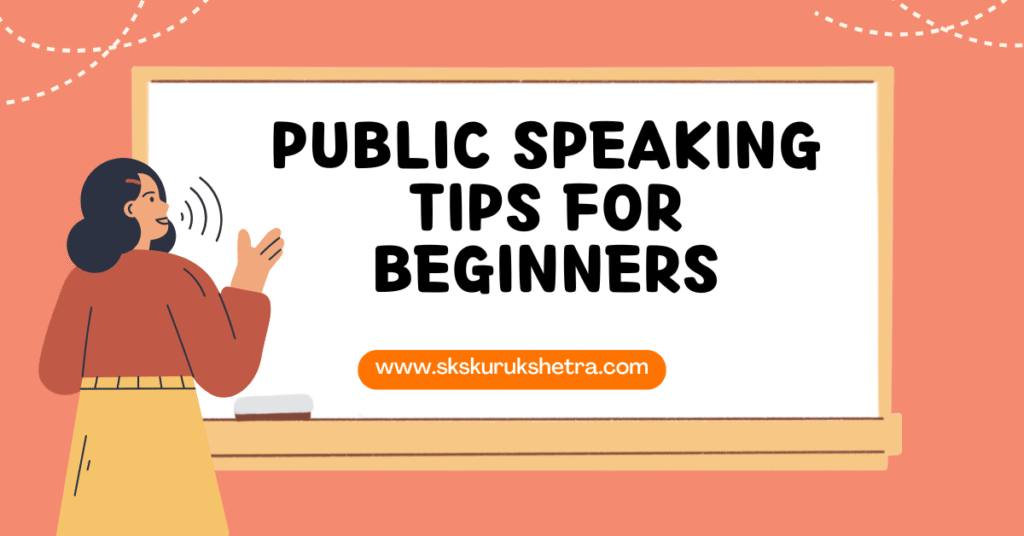Public speaking is a powerful skill that can transform your personal and professional life.
Whether you’re addressing a classroom, leading a meeting, or giving a presentation at a public event, your ability to speak clearly, confidently, and convincingly matters a lot.
If you’re just starting your public speaking journey, you might feel nervous or unsure. Don’t worry — every great speaker was once a beginner.
This complete guide will walk you through practical, easy-to-follow public speaking tips for beginners so you can overcome fear, build confidence, and leave a lasting impression on your audience.
Why Public Speaking Matters
Before we dive into the tips, let’s understand why public speaking is such a valuable skill:
- Builds confidence: Speaking in front of others boosts your self-esteem.
- Strengthens communication: You learn how to convey ideas clearly and effectively.
- Increases opportunities: Great speakers are more likely to be selected for leadership roles, jobs, and academic presentations.
- Boosts academic and career growth: Whether you’re in college or the workplace, speaking skills set you apart.
Common Fears and Challenges Faced by Beginners
You’re not alone if public speaking makes you nervous. Here are a few common issues:
- Stage fright or anxiety
- Fear of forgetting lines
- Speaking too fast or too slow
- Lack of eye contact
- Unclear voice or tone
- Feeling underprepared
These are normal. The good news? All of these can be overcome with practice and the right techniques.
Public Speaking Tips for Beginners: A Step-by-Step Guide
1. Start with Knowing Your Topic Thoroughly
The more you understand your topic, the more confident you’ll feel.
Tips:
- Research deeply.
- Add personal stories or examples.
- Prepare answers for possible questions.
2. Know Your Audience
Understanding your listeners helps you tailor your speech to their interests.
Tips:
- Are they students, professionals, or a general crowd?
- What language and tone will suit them?
- What do they expect to learn?
3. Practice, Practice, Practice
You can’t be a great speaker without practice.
Tips:
- Rehearse in front of a mirror.
- Record yourself and watch it back.
- Ask a friend or mentor to listen and give feedback.
4. Structure Your Speech Effectively
A well-structured speech makes it easier for the audience to follow.
Basic format:
- Introduction: Grab attention with a quote, story, or surprising fact.
- Body: Main points with supporting details.
- Conclusion: Summarize and end with a call to action or thought-provoking idea.
5. Use Simple Language and Short Sentences
Avoid jargon or complex words, especially if you’re nervous.
Tips:
- Use everyday vocabulary.
- Keep sentences short and punchy.
- Speak how you naturally talk, just a bit more clearly.
6. Maintain Eye Contact
It helps build a connection with your audience.
Tips:
- Don’t stare at one person. Look around the room.
- Divide your audience into sections and address each one.
7. Watch Your Body Language
Non-verbal cues matter just as much as your words.
Tips:
- Stand tall and don’t slouch.
- Use hand gestures naturally.
- Avoid pacing or fidgeting.
8. Control Your Voice
Your tone, pitch, and volume convey emotions and emphasis.
Tips:
- Avoid monotone speaking.
- Practice pauses to add impact.
- Emphasize key words.
9. Start with Small Groups
If you’re really nervous, begin with smaller audiences.
Tips:
- Speak at family gatherings or student clubs.
- Volunteer at local events.
- Participate in classroom presentations.
10. Accept Feedback and Improve
Feedback is your friend, not your enemy.
Tips:
- Note what went well and what didn’t.
- Don’t take criticism personally.
- Keep improving with each speech.
Advanced Public Speaking Tips (Once You’re Comfortable)
Once you’ve mastered the basics, consider the following:
11. Use Visual Aids
PowerPoint slides, props, or videos can help explain complex ideas.
12. Learn to Handle Questions Gracefully
Tips:
- Repeat the question to clarify.
- Stay calm even if you don’t know the answer.
- Admit when you’re unsure and offer to follow up later.
13. Develop Your Signature Style
Be yourself! Find what makes your speaking unique — humor, storytelling, energy, etc.
14. Attend Speaking Events and Observe Others
Watch TED Talks, attend seminars, and analyze other speakers’ strengths.
Public Speaking Activities to Build Confidence
Here are some fun and effective ways to sharpen your public speaking:
- Join a debate club
- Participate in elocution competitions
- Attend open mic events
- Start a podcast or YouTube channel
- Practice daily news reading aloud
- Try storytelling in front of friends
Mistakes Beginners Should Avoid
- Memorizing the entire speech word-for-word
- Reading from slides or notes too much
- Speaking too fast due to nerves
- Ignoring time limits
- Not adjusting speech for the audience
Remember, mistakes are a part of learning. The more you speak, the better you get.
Tools and Resources to Help You
Here are some tools to help improve your public speaking:
- Apps: Orai, Speeko, Ummo
- Books:
- Talk Like TED by Carmine Gallo
- The Quick and Easy Way to Effective Speaking by Dale Carnegie
- Courses: Public speaking courses on Coursera, Udemy, or even local colleges
- Communities: Join Toastmasters or local speaking clubs
Real-Life Examples: How Public Speaking Transforms Lives
- From Shy to Speaker: A college student afraid of presentations now leads workshops for juniors.
- Career Growth: A young manager gained promotions after mastering presentation skills.
- Entrepreneur Success: A small business owner attracted clients through confident pitching.
These stories are not rare — they’re what public speaking makes possible.
SKS Group of Colleges: Nurturing Confident Communicators
At SKS Group of Colleges, near NIT, Kirmach Road, Kurukshetra, we believe that education is not just about textbooks. Our students are encouraged to actively participate in debates, presentations, and public speaking events from the beginning of their academic journey.
Through a blend of academic rigor and co-curricular activities, we ensure our learners develop the confidence to speak up, lead discussions, and represent their ideas on larger platforms.
That’s why many of our alumni are now leaders in their fields — empowered not just by knowledge, but by the confidence to communicate it.
How to Keep Improving Every Day
Public speaking is a journey — not a one-time goal. Here’s how to grow:
- Practice speaking 5 minutes a day.
- Learn one new public speaking tip each week.
- Attend workshops and webinars regularly.
- Teach others — it reinforces your own learning.
- Celebrate small wins — even speaking in class is progress!
Final Thoughts: You’ve Got This!
Everyone starts as a beginner. The nervous voice, the sweaty palms — even the greatest speakers have been there. What sets them apart is persistence, practice, and passion.
You don’t need to be perfect. You just need to start.
So, the next time you get a chance to speak — whether it’s in your classroom, college fest, or a community event — take it. Use these tips. Stand tall. Speak with your heart.
Because the world needs your voice.

